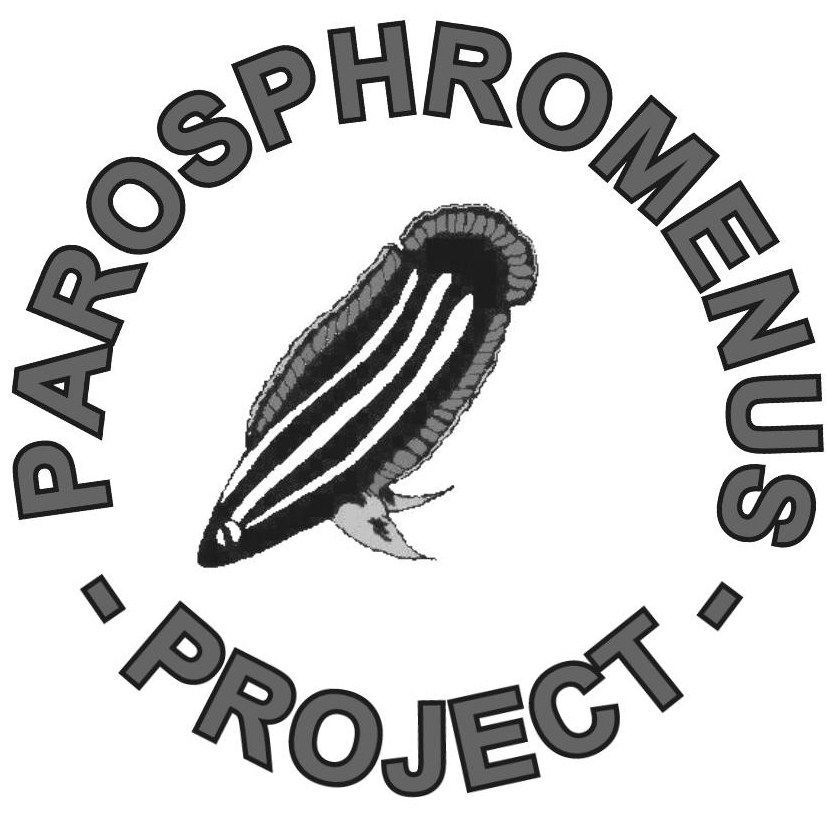Parosphromenus-Newsletter No.92 Bielefeld (Germany), October 10th 2011

1. Current census is running! Please take part!
On October 1st, the current census of the aquarium stocks of our fish was started. We have
simplified it (a special form is not longer necessary) and also the evaluation (Ch. Hinz, Berlin
/ D) will be presented in a modified more concise and understandable way.
Take part: This is our request! In the first ten days, about 20 responses were received,
including some from Asia and America. If this continues, we can be very satisfied. Please, do
continue sending your data, then the result will mirror a realistic image. Even if you should
keep only one species, even with no young fish, it may be important for the overall picture to
know this. Just send an email with your inventory to census@parosphromenus-project.org. If
you have hitherto undescribed forms and variants, you will know the name, which you have
been told. Under https://parosphromenus-project.org/de/arten/other-forms.htm you will find
(almost) all provisional names. Unfortunately, the descriptions of these many variants are not
yet ready, but you will know what you have.
We would even be glad if you gave us a negative report if you keep no licorice gouramis at
present. Then we can assess the distribution of the fish more correctly.
2. Distribution of offspring is good under way
Our new service, to provide offspring of some species to those persons who normally have
problems to get hold of these fish, has started well. Bernd Bussler has sent the first animals
and they all arrived safely. There were no casualties. However, for the first time we have the
restricted the delivery area to Germany. There are some requests from the surrounding
countries, however, and we hope to solve that problem in the near future.
We have agreed on a price of € 15.00 per a single pair. Although this is still at the lower limit
of what a breeder should get for his effort of more than six months of rearing, it isa price
already reflecting the value of these rare fish. Fortunately, there is no discussion on that. One
must remember, however, that the shipping cost must be added.
There are several vendors who carry out such a shipping, and here we are still trying to assess
all eligible alternatives. We still have to learn which is the best way. Fortunately, our small
fish which behave rather motionless belong to those which could be shipped in the smallest
amounts of water. But we will nevertheless learn and optimize the service.
If someone of you is still interested in the species now available (linkei, spec. Seruyan,
harveyi and paludicola Paka), they may still contact me (peter.finke@parosphromenusproject.
org): I collect orders and pass them on to Bernd Bussler. Later we will also come to
include other breeders (and other species) in the program. Meanwhile, we also refer to the
“have and search” of the EAC (www.aklabyrinthfische-eac.eu/habenundsuchen-e.html). At
the just ended meeting of the IGL in Hamburg, this time an unusual high number
Prachtguramis has been offered.
3. Involved in resolution of NNVE concerning the indigenous peoples of Malaysia and
Kalimantan
From 9-12th September this year’s annual meeting of the “Network of Natural History
Associations in Europe” (NNVE) was held at the Museum Alexander Koenig in Bonn. At the
following day 13th September a special workshop on new methods of conservation work in
the Internet age was held with the aim to demonstrate best practices which allow to animate
many people in different countries to collaborate. Peter Finke presented in this context the
Parosphromenus-Project, and it took a lot of attention. Some active groups from different
countries had prepared a documentation for this workshop that showed that the indigenous
people of Malaysia and Indonesia suffer very much under the rainforest logging and
subsequent reforestation with huge palm oil plantations, which many governments have
always played down as a sustainable project for the production of renewable raw materials.
Therefore together with these active groups and others, the Parosphromenus-Project directed a
resolution to the German Federal government and to the European Commission, to stop with
the false justifications for fuels such as “E 10” and the wrong propaganda by promoting such
environmentally and culturally harmful products that massively harm the traditional living
and culture of the “little people” in those countries (not to speak about our fish).
4. First International Meeting of the friends of Parosphromenus planned for 2013
As previously announced, the Parosphromenus-Project plans a first International Meeting of
the friends of the genus Parosphromenus for the second half of 2013 in Hamburg. The exact
date is not yet fixed, but we hope to offer an attractive program, and thus attract some friends
from near and far to be able to come. All our partners will be invited to participate. Above all,
we shall try to integrate our two German partner organizations, the EAC and the IGL with its
licorice gouramis working group. We will do our best to announce the event well in advance
so you can hopefully plan a trip in time.
So much for today. With best wishes, by order of the steering group, signed Peter Finke

